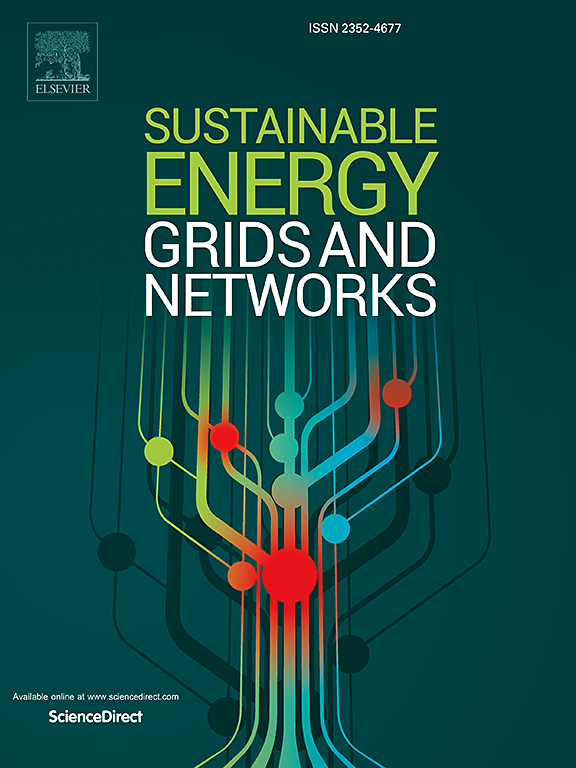集成电、气系统能量流的快速分解
IF 4.8
2区 工程技术
Q2 ENERGY & FUELS
引用次数: 0
摘要
介绍了一种分析配电网内电、气一体化系统(IEGS)能量流的数学方法。尽管天然气流的非凸特性传统上是使用二阶锥规划(SOCP)来处理的,但随着系统规模的增加,基于SOCP的公式会出现计算效率降低和求解器兼容性问题。为了解决这些挑战,本文提出了一种基于泰勒级数的一阶线性逼近方法,该方法保持了线性,从而使计算速度更快,并且与标准优化求解器更好地兼容。尽管该方法具有迭代性,但其收敛速度快、精度高。在径向IEEE 33总线/33节点系统、网状IEEE 8总线/8节点气体网络和大规模IEEE 118总线/118节点系统等多个测试系统上进行了验证。仿真结果表明,与传统的基于sopp的方法相比,该方法具有更高的逼近精度和更快的计算速度,验证了该方法在实际IEGS运行分析中的有效性。本文章由计算机程序翻译,如有差异,请以英文原文为准。
Fast decomposition of energy flow for integrated electricity and gas systems
This paper introduces a novel mathematical approach for analyzing energy flow in Integrated Electricity and Gas Systems (IEGS) within distribution networks. Although the non-convex nature of natural gas flow has traditionally been handled using second-order cone programming (SOCP), SOCP-based formulations suffer from reduced computational efficiency and solver compatibility issues as system scale increases. To address these challenges, this paper proposes a Taylor series-based first-order linear approximation method that maintains linearity, thereby enabling faster computation and better compatibility with standard optimization solvers. Despite its iterative nature, the proposed method exhibits rapid and accurate convergence. Validation was conducted on several test systems, including the radial IEEE 33-bus/33-node system, a meshed IEEE 8-bus/8-node gas network, and the large-scale IEEE 118-bus/118-node system. Simulation results demonstrate that the proposed approach achieves higher approximation accuracy and faster computation compared to conventional SOCP-based methods, confirming its effectiveness for practical IEGS operation analysis.
求助全文
通过发布文献求助,成功后即可免费获取论文全文。
去求助
来源期刊

Sustainable Energy Grids & Networks
Energy-Energy Engineering and Power Technology
CiteScore
7.90
自引率
13.00%
发文量
206
审稿时长
49 days
期刊介绍:
Sustainable Energy, Grids and Networks (SEGAN)is an international peer-reviewed publication for theoretical and applied research dealing with energy, information grids and power networks, including smart grids from super to micro grid scales. SEGAN welcomes papers describing fundamental advances in mathematical, statistical or computational methods with application to power and energy systems, as well as papers on applications, computation and modeling in the areas of electrical and energy systems with coupled information and communication technologies.
 求助内容:
求助内容: 应助结果提醒方式:
应助结果提醒方式:


